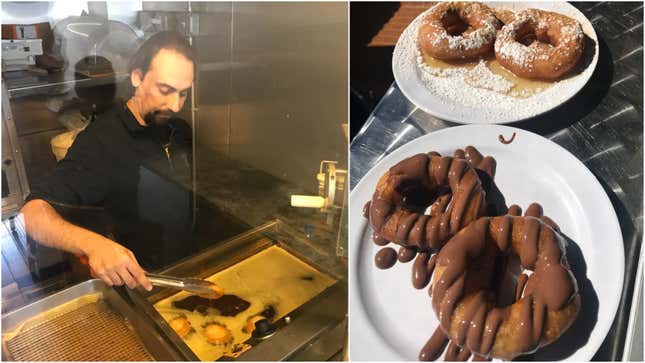
If you’re looking for the world’s best doughnut you’d suffocate under an avalanche of contenders (and arguments). But if you’re looking for the world’s first doughnut, just look to the Greeks. It stands to reason, as they invented many of Western civilization’s greatest contributions to humankind, but loukoumades—let’s call them Greek doughnuts—reach a whole new level. Sometimes without any hole at all.
What are loukoumades?
While hot cross buns are synonymous with Easter, those who celebrate Greek Easter (most often falling on a different date) scarf down loukoumades. (Not that they’d turn down some melopita, aka honey pie, or the honey cookies known as melomakarona.) Loukoumades are enjoyed year-round, but Easter is the treat’s peak season. And just like Cadbury Eggs, they really deserve to be enjoyed by everyone regardless of religious affiliations.
To the outsider, these fried yeasty treats could be misconstrued as mini doughnuts or doughnut holes, depending on their shape. But their Greek kiss most often reveals itself when topped with honey and cinnamon to serve, and maybe some sesame seeds for good measure. Winners at the very first Olympic Games (in Greece, naturally) back in the eighth century BCE weren’t given gold medals, but golden tokens of honey-sweetened loukoumades since honey was treated as liquid gold. And that’s pretty much how Panagiotis “Pek” Peikidis treats them, too.
Peikidis owns Café Boulis in the Astoria neighborhood of Queens, a pocket known as Greektown. If you relocated every Greek American from across New York City back to Greece, all purported 180,000 of them, they’d constitute that country’s third largest population after Athens and Thessaloniki. Café Boulis, adjacent to a Greek church and Greek school, sits three blocks from a park called Athens Square where sculptures of iconic Greeks such as Socrates, Sophocles, Aristotle, and Athena dwell.
The first big wave of Greek immigration in the early 20th century saw first-gen Greek Americans fan out from New York down to Florida or over to Chicago; the second wave, from the 1960s to 1980s, largely settled in the familiar borough of Queens. That wave included Christos Peikidis and his wife, Lemona. While the couple had two sons in New York, Pek and Harris, the family eventually moved back to Greece, where Pek fell in love with Greek coffee culture. It wasn’t unusual, he says, for him to spend up to six hours a day at the café operated by his mother.

He’s also the one responsible for the family’s eventual migration back to New York along with his Greek-born sisters, Evantia and Eugenia. After earning a degree in computer science in Greece, Peikidis joined the fast-paced world of video game development. However, he bought Café Boulis from its founder a decade ago as his way to extricate himself from the more stressful video game field. These days you’ll occasionally find the Peikidou women working at Boulis, too. If you don’t have much of a sweet tooth, then try Mama Peikidou’s spanakopita (spinach pie).
The café is more than a place to find Greek coffee—which, by the way, is the same as what most Americans know as Turkish coffee. Greece and Turkey share a lot of culinary similarities, even if they don’t share the same name. For example, lokma or loukma are Turkish doughnuts, and as an interesting footnote to the first Olympians’ winnings, lokma means “judge’s morsel.”
But it’s loukoumades that are the compulsory accoutrement in Greek coffee culture from Athens to Astoria. Before the pandemic, there was even an independent walking tour operator who conducted Greektown tours. While other nearby tavernas offer loukoumades on their dessert menus, the selfie-sticks were raised high at Boulis to show everyone devouring them here.
How Greek doughnuts are made
“In Greece, where we have big families, you want a cheap way to feed them,” says Peikidis. “Loukoumades are pretty much just batter. You fry it up, put a few toppings on it, and that’s it. The cost of making it is super low and the taste is really good. So it’s an easy way for families to make treats.”
In addition to the traditional honey and cinnamon-topped loukouma (that’s the singular), Boulis offers ones drizzled with Nutella or sour cherry. When summer rolls back around, the café resumes offering a freshly fried plateful a la mode.
The only traditional topping you won’t find here is crushed walnuts. If anything, that’s a primary distinction between Greek desserts and Turkish ones: Greeks are fond of using walnuts while Turks traditionally employ crushed pistachios.
But while Turkey is a huge honey producer and its citizens consume roughly 50 percent more of the bee juice than Americans, Greeks consume 50 percent more than Turks, per capita, as Europe’s leading consumers. So yes, eating loukoumades with all that liquid gold really does make you feel like a champion.